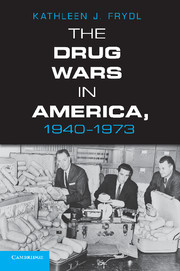Conclusion
War on Trade – The Drug War as Past and Future
Published online by Cambridge University Press: 05 April 2013
Summary
Modern drugs and the war against them have produced a number of alternate states. Countless people, be they broken or bored, frail or fearless, sought refuge in the altered reality produced by drugs. Those who denounced such behavior often endorsed a set of interventions that contradicted other cherished beliefs. Conservatives who normally embraced a minimal state presence nonetheless supported aggressive state actions of interdiction and punishment; isolationists critical of U.S. international engagement came to believe that only extraterritorial action abroad would diminish the supply of drugs at home. Similarly, urban liberals and left-wing intelligentsia who worked to install confidence in the operations of the state began, in the 1980s, to express a skeptical view of the state-sponsored efforts of the “drug war.” Like the drug users they claimed to steward, crusaders of either stripe experienced a temporary disconnect when it came to drugs. Significantly, the drug war has produced an “alternate state” in the most literal sense: a statutory structure, law enforcement regime, and international project that stood astride the normal functioning of the state, ostensibly to help strengthen and legitimize its function, but ultimately demonstrating that state’s manifest weakness and vulnerability. Whether the drug war was notional, deployed mainly as a rhetorical device, or fully realized, featuring military assaults and, in the case of Manuel Noriega in Panama, toppling a regime, it is a war that has been lost.
Its futility does nothing to undermine its significance as a project of the state. Indeed, there are a number of ways in which the federal government’s prosecution of the modern drug war provides a lens through which to view the recent past. First, the state’s prosecution of the modern drug war joins with some aspects of African American history, and especially so given the newly restored focus on race discrimination and segregation above the Mason-Dixon line. What is more, while older work on the black freedom movement typically adopted a chronology that culminated in the historic legislation of the Great Society, newer scholarship maps the fight for equality onto urban history – either directly, or by sketching the white backlash that animated suburban development – and brings the story well into the 1970s.
- Type
- Chapter
- Information
- The Drug Wars in America, 1940–1973 , pp. 418 - 440Publisher: Cambridge University PressPrint publication year: 2013



